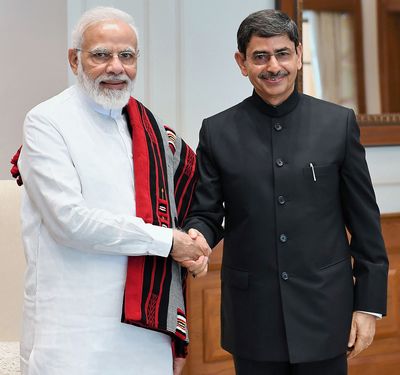ON JANUARY 29, Thuingaleng Muivah, the 86-year-old general secretary of the Isak-Muivah faction of the National Socialist Council of Nagaland, left the group’s headquarters in Camp Hebron for Chumukedima, a tourist village in Dimapur district. It was a long, bumpy ride through dusty, potholed roads. So Muivah rested that night and joined a team of negotiators of the NSCN(IM) the following morning. Together, they met R.N. Ravi, the Union government’s interlocutor for Naga peace talks.
Ravi had facilitated the signing of a framework peace agreement between the Union government and the NSCN(IM), the largest of the Naga insurgent groups, in 2015. The final agreement was to be signed before October 31, 2019 last year, but talks had reached a stalemate and the deadline passed.
The meeting at Chumukedima was meant to iron out differences and help finally conclude the peace talks that had been going on since 1997, when the NSCN(IM) signed a ceasefire agreement with the government. But it did not go as planned. Ravi wanted the NSCN(IM)’s negotiators to accept that the peace talks under the framework agreement were being held “within the framework of the Indian Constitution”. The NSCN(IM) negotiators were dismayed; they said the framework agreement had provided for a “new relationship” between India and Nagaland, outside the Constitution’s purview.
Matters went downhill fast. The NSCN(IM) accused Ravi of having “manipulated” the peace process. Ravi reportedly said even “Class 7 students” could understand that accepting the Constitution was part of the framework agreement. Foul words were exchanged.
Muivah felt Ravi had broken his trust. Under the framework agreement, the two sides had agreed to hold talks based on “mutual respect and understanding” to end the decades-long insurgency. After the meeting, though, the NSCN(IM) said peace talks were “coming to a nauseating end because of the mischief of the interlocutor”.
Trouble has been brewing since last July, when Ravi was appointed as Nagaland governor even as he held on to the post of interlocutor. NSCN(IM) leaders alleged that the deadline set by him for signing the peace deal was never part of the framework agreement. According to them, “shared sovereignty” was the only way forward to end the conflict. For his part, Ravi accused NSCN(IM) of imputing “imaginary content” to the framework agreement.
Muivah, who has been camping in Delhi, wants Ravi to be removed as interlocutor immediately. According to sources, the Prime Minister’s Office has asked two directors in the Intelligence Bureau to reach out to the NSCN(IM) and sort out differences. Security agencies worry that the tension could kickstart a fresh wave of insurgency in Nagaland. That Ravi is absent from the talks in Delhi shows the Union government’s declining confidence in him as an interlocutor.
Ravi was not always disliked. In fact, Naga Hoho, the apex tribal body in the state, and the seven-member Naga National Political Groups (NNPG) were initially happy with the signing of the framework agreement and the progress of the peace talks. “Ravi took initiative to bring the NNPG on board by signing the 2017 Agreed Position or Preamble with them,” said Elu Ndang, general secretary of Naga Hoho. “The Naga people want a solution. But before arriving at it, Ravi was made governor. That dual role has created a huge problem.”
In June, Ravi wrote to Chief Minister Neiphiu Rio that the “scenario in the state is grim” and that “law and order has collapsed”. He alleged that the state government remained a mute spectator as “armed gangs” operated freely in the state. “The same people [the NSCN(IM) and the NNPG] whom the government had been talking to for 23 years were termed by Ravi as armed gangs,” said Eu Ndang. “It was uncalled for. Ravi also insisted that the state government make government employees declare their links with Naga political groups. What was the need for him to term it as a law and order problem?”
The NSCN(IM) recently released what it claims to be a copy of the framework agreement, which had been kept confidential by mutual consent since 2015. The copy says the agreement “will provide for an enduring, inclusive new relationship of peaceful coexistence of two entities”. According to the NSCN(IM), the word ‘new’ is absent in the “doctored” document allegedly prepared by Ravi. “‘New relationship’ strongly indicates [that the agreement is] outside the purview of the Indian Constitution,” said an NSCN(IM) leader. “When that word is removed, there is room for misinterpreting it as being under the Constitution.”
The Union home ministry has decided not to release the framework agreement under the Right to Information Act. The decision has been upheld by the chief information commissioner, who ruled that the disclosure can affect India’s security and strategic interests. So the question of whether the agreement was doctored is not likely to be resolved soon.
Naga groups are now split over the future of peace talks. The NNPG openly support Ravi, saying the agreement he had signed with them in 2017 gave “fresh impetus to the stagnant talks”. Alezo Venuh, coordinator of the NNPG’s working committee, said the NSCN(IM) had destroyed the Naga people’s relationship with their neighbours in Assam, Manipur and Arunachal Pradesh.
P. Chuba, former president of Naga Hoho, however, said Ravi’s divide-and-rule policy had precipitated the present crisis. “After two years of consultations with the NSCN(IM), Ravi was trying to sideline the group,” he said. “No inclusive settlement can happen with a divide-and-rule policy. It will intensify bloodshed.”
H.D. Deve Gowda, who was prime minister when the NSCN(IM) signed a ceasefire agreement with the government in 1997, issued a statement saying the progress made in the last 23 years should not be forsaken now. “I sincerely hope,” he said, “that the distrust is put aside, talks continue, and a peace accord is reached at the earliest.”



